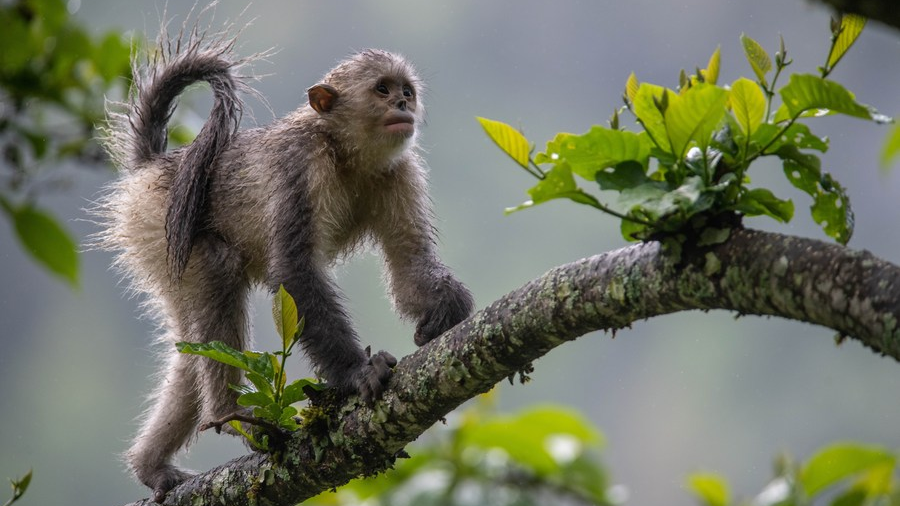
A snub-nosed monkey is pictured at Yunnan Snub-nosed Monkey National Park in Shangri-La, Deqen Tibetan Autonomous Prefecture, southwest China's Yunnan Province, May 23, 2020. /Xinhua
A snub-nosed monkey is pictured at Yunnan Snub-nosed Monkey National Park in Shangri-La, Deqen Tibetan Autonomous Prefecture, southwest China's Yunnan Province, May 23, 2020. /Xinhua
Editor's note: Liu Chunsheng is an associate professor at the Central University of Finance and Economics in China. The article reflects the author's opinion, and not necessarily the views of CGTN.
On October 12, Chinese President Xi Jinping announced the establishment of a fund to support developing countries in biological diversity conservation during the leaders' summit of the 15th meeting of the Conference of the Parties to the Convention on Biological Diversity (COP15) held in Kunming, Yunnan Province. China promised to make an initiative investment of 1.5 billion yuan to the Kunming Fund.
This is not the first time that China has set up a fund with the theme of "ecological protection." In 2020, China set up the national green development fund with an initial fund-raising scale of 88.5 billion yuan, focusing on guiding social capital to ecological and environmental fields such as air, water, soil and solid waste pollution governance to promote environmental protection and sustainable economic and social development.
Biodiversity is an important symbol to measure a country's ecological environment quality, ecological civilization, national competitiveness and high-quality development. China is one of the countries with the richest levels of biodiversity in the world. Biodiversity protection is an important part of the construction of an ecological civilization, a concentrated embodiment of the harmonious coexistence between man and nature, an effective carrier for practicing the concept of green development, promoting high-quality development and building a beautiful China. Biodiversity conservation is not only a scientific issue, but also an important political, economical and social issue.
Since China joined the United Nations Convention on Biological Diversity in 1992, the term "biodiversity" has gradually become well-known to the Chinese people and biodiversity protection has also become the content of planning of governments at all levels. Especially since the 18th National Congress of the Communist Party of China, in the process of building an ecological civilization, China has implemented large-scale actions, policies and regulations. The well-being brought by biodiversity has gradually been recognized by the society. Understanding and protecting biodiversity has become a conscious action of the whole society.

Oriental white storks fly over Caofeidian wetland in Tangshan, north China's Hebei Province, November 5, 2019. /Xinhua
Oriental white storks fly over Caofeidian wetland in Tangshan, north China's Hebei Province, November 5, 2019. /Xinhua
The Chinese government has formulated a series of biodiversity protection policies, regulations and measures, increased supervision, and established a coordination and decision-making mechanism under the State Council. China invested a lot of funds in protection capacity-building, established a national biodiversity monitoring network, and made good progress in biodiversity research. Since the 1980s, China has implemented plenty of ecological projects, including natural forest protection, wildlife protection and nature reserve construction, which have protected and restored biodiversity to a certain extent. In addition, China is putting great efforts to end the threat of international trade to wildlife species, control the invasion of alien species, and strengthen the sustainable utilization of wildlife raw materials and products.
In terms of international cooperation, China has concluded more than 50 international conventions and agreements on biodiversity and environmental protection, including the Convention on Biological Diversity, United Nations Framework Convention on Climate Change, United Nations Convention to Combat Desertification and has actively fulfilled its international obligations. China has carried out biodiversity conservation cooperation with neighboring countries and developing countries through mechanisms such as the Belt and Road Initiative.
Since 2019, China has become the largest contributor to the core budget of the Convention on Biological Diversity and its protocols, and has strongly supported its operation. In recent years, China has continued to increase its contribution to the Global Environment Facility (GEF), and has become the largest developing donor country in it.
Many developing countries have rich but fragile biodiversity resources. Limited by their economic development level and capacity, most developing countries cannot afford more funds for biodiversity conservation and better balanced development and require cooperation and support of the international community. China's initiative investment has not only set an example for the world, but also greatly boosted the confidence of the international community in achieving the goal of biodiversity conservation after 2020 and will help to promote the negotiation process.
As the host country of the COP15 conference and the first country to vigorously recover from COVID-19, China's commitment to establishing a biodiversity fund not only reveals its determination to achieve a more balanced and sustainable development with high quality, but also shows it will take up its responsibility as a major global player.
(If you want to contribute and have specific expertise, please contact us at opinions@cgtn.com.)

